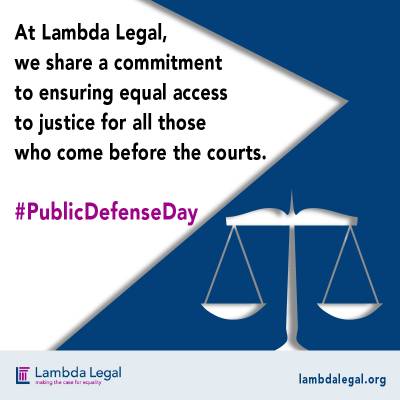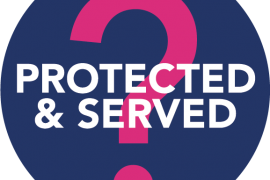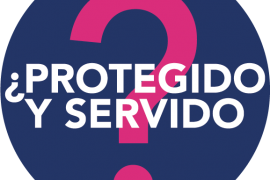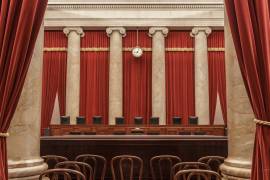
Lambda Legal's Commitment to Ensuring Equal Access to Justice on National Public Defense Day
Blog Search
This blog post was co-authored by Richard Saenz, Lambda Legal staff attorney and program strategist on criminal justice and police misconduct issues, and Eric Lesh Lambda Legal Fair Courts Project Director.
This week began with a powerful statement by the federal government, one which Lambda Legal applauds and supports: People should not be forced into a cycle of poverty and criminalization based on the inability to pay criminal and administrative fines.
This week ends with the anniversary of Gideon v. Wainwright, the landmark ruling ensuring legal representation to those charged with serious crimes regardless of their ability to hire a lawyer. Lambda Legal celebrates both of these critical recognitions about our legal system and its obligation to treat people fairly regardless of their incomes.
On March 18, 1963, the U.S. Supreme Court ruled in Gideon v. Wainwright that indigent defendants facing felony criminal charges have the right to an attorney. The right to defense counsel is a bedrock principle of our criminal legal system and an essential component of ensuring due process. National Public Defense Day now marks the anniversary of this landmark case.
On this 52nd anniversary of Gideon, Lambda Legal recognizes the enormous contributions of public defenders and applauds the U.S. Department of Justice for its letter to state and local courts condemning the illegal enforcement of fines and fees in certain jurisdictions.
The criminalization of poverty disproportionately impacts our community, and in particular, transgender people and LGBT people of color.
According to a 2012 Gallup survey, LGBT people living alone are were more likely than non-LGBT people to have incomes near or below the poverty level, and married or partnered LGBT parents raising children were twice as likely to have household incomes near the poverty level compared to married or partnered non-LGBT parents. For years, Lambda Legal has worked to combat discrimination in education and employment, two drivers of poverty in our communities.
The illegal enforcement of fees and fines is just one of the many injustices low-income LGBT people and people living with HIV experience in the courts. In 2012, Lambda Legal conducted a national survey to explore government misconduct by the police, courts, prisons and school security against LGBT people as well as people living with HIV in the United States. Our survey, like others, found that LGBT people and people living with HIV experience significant discrimination at the hands of the very government institutions that are supposed to protect them and ensure their civil rights.
This survey was one of only a few to explore the discrimination LGBT people and people living with HIV experience in the court system. The results show some of the ways the promise of fair and impartial proceedings is tainted by bias related to sexuality, gender and HIV.
- Nineteen percent of respondents reported hearing a judge, attorney or other court employee make negative comments about a person’s sexual orientation, gender identity or gender expression.
- Sixteen percent of respondents reported feeling their own sexual orientation or gender identity was raised when it was not relevant.
- Fifteen percent of respondents reported having their HIV status raised when it was not relevant.
As is often the case, respondents with intersecting marginalized identities – such as LGBT people who are low-income, people of color and/or disabled – reported significantly higher instances of discrimination.
Lambda Legal’s Fair Courts Project works to advance an independent, diverse and well-respected judiciary that upholds the constitutional and legal rights of LGBT people and those with HIV, while ensuring equal access to justice for everyone. Our “Know Your Rights in Court” resource on is designed to empower court users by providing tools to assist with self-advocacy.
Lambda Legal supports the DOJ’s guidance that courts must ensure the defendant’s right to counsel in appropriate cases when enforcing fines and fees. Tethering low-income defendants to the criminal legal system due to their inability to pay a debt is a harsh misuse of government power that can worsen mass incarceration.
We will continue to fight to end discrimination and injustice in the criminal legal system, including opposing harmful fines and fees, unfair sentencing and incarceration, and police misconduct; supporting decriminalization of sex work; ending the school-to-prison pipeline, and speaking out to abolish the death penalty.
If you have experienced discrimination, contact Lambda Legal’s Help Desk.




